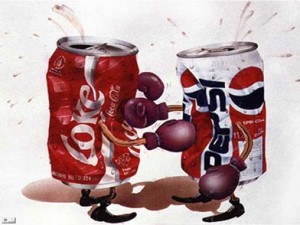“Enjoy Coca Cola!”
In 2012, Coca Cola’ advertising expenses accounted for more than $3 billion. In order to increase the company’s sales and brand recognition, Coca-Cola expenses production cost on print, radio, Internets, and television advertising.
HOLD ON…
Who does not know about Coca-Cola? Since it is arguably one of the most recognizable brands of the 21st Century, why does Coca-Cola still advertise?
Coca-Cola never failed to stay on top of mind awareness in the soft drinks industry because the company understands as part of the marketing tool, advertising is very important in an organizational structure. The firm also comprehends the fact that its typical commodities can easily be replaced by another brand’s similar product, such as Pepsi or Sprite.
With this idea imbedded in mind, there are few fundamental reasons that even the “Big Giant” needs to advertise:
- To maintain “top of mind awareness.”
- To secure the next generation of consumers.
- Adapt to changing consumer behaviours.
- To consolidate or possibly expand its market shares.
- Continue to build consumer loyalty.
While the brand continues to vastly advertised in the mainstream media, a consumer will always remember the presence of coke whenever he or she attempts to reach for another brand’s soft drinks.

Reference:http://www.theawsc.com/2013/08/28/why-big-brands-like-coca-cola-still-need-to-advertise/


